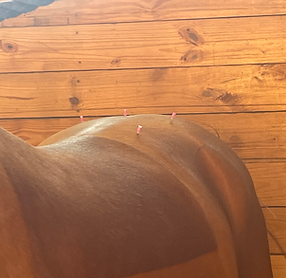Cedar Hill Mobile Equine

Experience top-notch mobile veterinary services for your horse in Western North Carolina and Upstate South Carolina. Dr. Aaron Langley treats every horse with compassion and skill.
Get to Know Us
Dr. Aaron Langley is a dedicated and compassionate veterinarian who graduated in 2009 from Colorado State University. He combines expert medical knowledge with alternative therapies. He received chiropractic training through Options for Animals and acupuncture training through Medical Acupuncture for Veterinarians. Dr. Langley has a focus on equine podiatry, having been a farrier before attending veterinary school. He is known for his calm, reassuring presence and clear communication with clients. When he's not in the field treating equines, he can be found fishing, at the motocross track with his son, or supporting his wife and daughter with their horses.
Services
Cedar Hill Mobile Equine provides a variety of services to help care for your horse. If you would like more information on any of our services, please contact us today.
The conformation of the horse’s mouth can lead to the production of hooks, ramps and points that can lead to ulcers or sores in the mouth from constant wear on sharp teeth. We routinely check all horses at the time of vaccination and will make recommendations on the frequency of your horse’s dental needs.
Digital radiography provides us with an x-ray image that can be viewed on a high-resolution monitor within seconds without the need for film developing.
In our practice, chiropractic and acupuncture helps us return patients to normal function. Many times the horse has been treated with traditional therapies and still not preforming up to expectations. We use chiropractic and acupuncture to aid us in diagnosing soreness and lameness.
The importance of a healthy hoof to the soundness of a horse is undeniable. We can provide recommendations for your farrier based on digital radiographs for proper shoeing and hoof conformation.
Platelet Rich Plasma (PRP) is a regenative therapy that uses the body's own healing factors. Blood is collected from the patient and processed to concentrate and seperate out the platelets .
RenoVo is an amniotic tissue allograft rich in cytokines, growth factors, and other proteins. Similar to stem cells, it enhances healing and reduces development of scar tissue in damaged tissues and joints.
Shockwave therapy is useful for a number of conditions causing lameness in the horse. These conditions include:
-
Suspensory ligament injury
-
Bowed tendons
-
Ringbone
-
Bone spavin
-
Bucked shins
-
Splints
-
Fractured splint bones
-
Sore backs
-
Navicular syndrome
Lameness continues to one of the most common causes of performance issues in our equine athletes. A thorough exam is used in combination with a good history to identify the location of the lameness. Once the area of concern has been identified, we use diagnostics including diagnostic anesthesia (nerve blocks), radiography or ultrasound to develop a treatment plan.
Field services include routine vaccinations, lameness, chiropractic, imaging, dentistry, lacerations, tumor removal, castration, ophthalmology, and preventive medicine.
A pre-purchase exam may include a physical exam, soundness exam, routine bloodwork, ultrasound, radiographs, and a drug screening. Each pre-purchase is tailored around the buyer's needs and intended use.
Ultrasound is used for the evaluation of the soft tissue structures of the horse. Tendons and ligaments cannot be examined via radiographs. However, they can be imaged using a diagnostic ultrasound technique. An ultrasound image is formed by transmitting high-frequency sound waves and reflecting these waves off of different tissue interfaces.
Routine care is essential to maintain health and performance. This includes annual physical exams, vaccinations, dental check-ups, and fecals for a deworming schedule. Monitoring for early signs of illness or injury, ensures timely treatment and prevention of more serious issues.
We provide emergency services 24/7 by co-oping with other veterinary practices so there will always be a doctor on call to assist in your equine emergencies. Our most common emergencies are trauma, colic, lacerations, grain overloads, swollen or injured eyes (often emergencies in the horse) and laminitis or founder. We do charge an after-hours emergency fee along with the other charges normally incurred for diagnosis and treatment.













